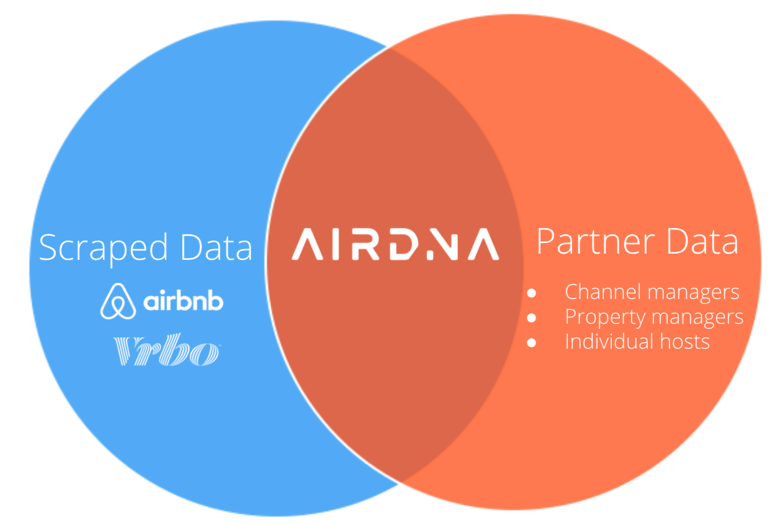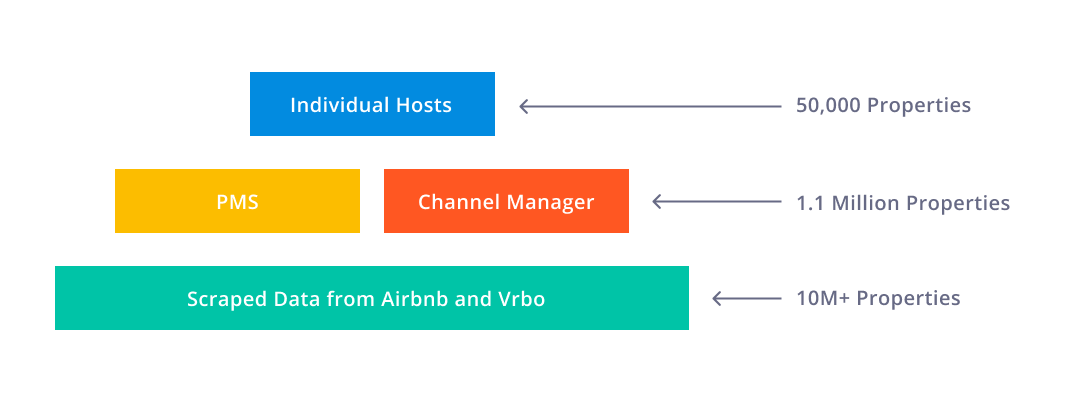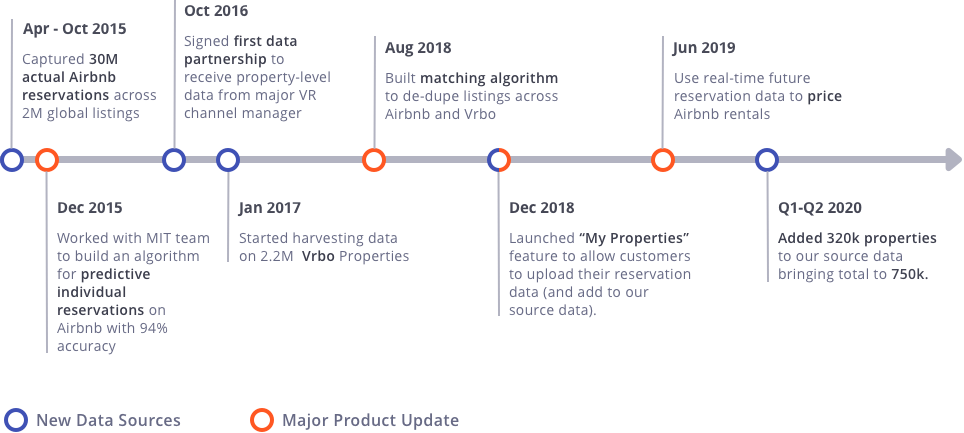Company
AirDNA Data: How it Works
Discover the science behind AirDNA data and how it works
AirDNA is proud to provide the most accurate and comprehensive vacation rental data and analytics in the world. Our goal is to empower the democratization of lodging and to help everyone from hosts to property managers and investors navigate their markets and achieve their short-term rental goals.
After over six years in the industry, there are a few questions customers invariably ask: “How does it work?” “Where does AirDNA get its data from?”
Here, we’re bringing clarity to the data — no smoke and mirrors, no secret sauce. We’ll outline where our data comes from, how the algorithms work, and how it’s best leveraged as a powerful tool for short-term rental professionals.
Start scrolling or click an item below to jump to a specific section.
Our Data Sources
At our core, there are two major categories of data that power AirDNA’s insights and analytics: scraped data, and partner data.

Scraped data at Scale
On a daily basis, our servers collect the reservation data for every listing on both Airbnb and Vrbo. From daily calendar pricing to cancellation policies and booking lead time, we aggregate and process comprehensive data on over 10 million properties in over 120,000 international markets. We do this by “scraping” (or extracting) data using a host of servers. The process is 100% legal, and our relationships with these booking platforms are strong and mutual.
Here’s how it works. (Find out more about our Booked vs Blocked methodology and matching algorithm below).

Partner Data from verified properties
As the data nerds in the room, we’re big on maintaining a diversified sample size. That’s why we’ve partnered with thousands of channel managers, hosts, and property management systems to add source data from over 1.1 million properties around the world. Data from these sources is 100% accurate and based on real reservation data. We add to this pool each month and leverage it as a quality control mechanism to fine-tune our reporting and analytics.
Host-Level Data in AirDNA
An important component of AirDNA’s source data is the information provided by subscribers. Each month, thousands of hosts and short-term rental managers connect their properties to AirDNA for personalized insights and competitive analysis. Just like the data provided by large-scale property managers, this data is 100% accurate.
We currently track the performance of over 35,000 properties. All in all, below is the hierarchy that makes up AirDNA data.

AirDNA Timeline
Put simply, no short-term rental data provider has been compiling information for as long as AirDNA. Our ability to develop such accurate modeling is made possible because of our extensive historical data which captured actual booked versus blocked data for 18 months prior to Airbnb’s decision to obscure information in Q4 2015. The longevity of our data is a large component of what powers our algorithms and allows us to deliver highly accurate analytics.
Here’s a breakdown of the AirDNA timeline.

Booked vs Blocked Days
The ability to discern between booked and blocked days is core to any analysis of vacation rental data. Since 2015, booking platforms have hidden this information from the public. AirDNA’s job is to answer these questions: Has a reservation truly been made? Or has the host simply blocked their calendar for maintenance or personal use? Knowing the difference is an absolute must for a sound revenue management strategy.
AirDNA has developed advanced artificial intelligence and machine learning technology that allows for accurate identification of blocks and unavailable days on Airbnb and Vrbo. By looking at 16 different booking signals such as the length of stay and how far in advance the booking is made, our booked vs blocked methodology is extremely accurate.
What’s more, our predictive model is always learning. As short-term rental trends continue to evolve over time, so do our algorithms. We do this by setting aside a portion of our known booked/blocked historical data, hiding it from the modeled data, and then ask the system to classify blocks of unavailable dates. This output is then compared to the actual known booked/blocked status of each booking to assess the degree of predictive accuracy.
Accounting for Dual-Listed Properties: AirDNA’s Intelligent Matching Algorithm
What if a property is listed on both Airbnb and Vrbo? Since multi-channel distribution has become commonplace, dual-listed properties must be accounted for in order to avoid overstating the market supply. Until recently, there has never been a way to accurately cross-reference listings across both platforms.
Enter AirDNA’s intelligent matching algorithm.

In early 2019, AirDNA developed a matching algorithm that leverages 14 metrics to determine whether a property is listed on both platforms. Features such as location, listing titles, listing descriptions, number of bedrooms, and calendar availability are imputed into a model that ultimately outputs whether a given pair is the same underlying property.
This way, AirDNA data is never exaggerated. One property = one data set. Read more about our matching algorithm here.
How Accurate is AirDNA Data?
Because we analyze both scraped and source data, we’re confident that AirDNA provides the most accurate vacation rental data in the world. Here’s our quality assurance cycle that leverages partner + host data to corroborate scraped data from Airbnb and Vrbo.

According to an official report by CBRE, the United States’ leading commercial real estate firm, AirDNA data was found to be extremely accurate across several key performance indicators.
In reporting the active supply of vacation rentals, CBRE found AirDNA data to be 97.5% accurate. For the revenue earned by short-term rental hosts, 96.2% accurate.
Time and time again, AirDNA data is corroborated by partners like CBRE all around the world. For more information on case studies showing AirDNA data used in action, click here.
Still have questions about AirDNA data? Here’s what you can do:
- Contact us to learn more about AirDNA’s data methodology
- Register for an AirDNA account to see the data